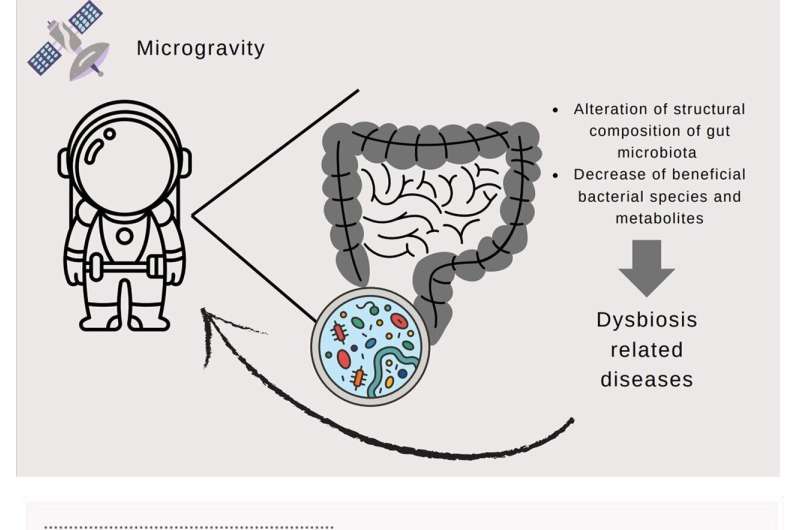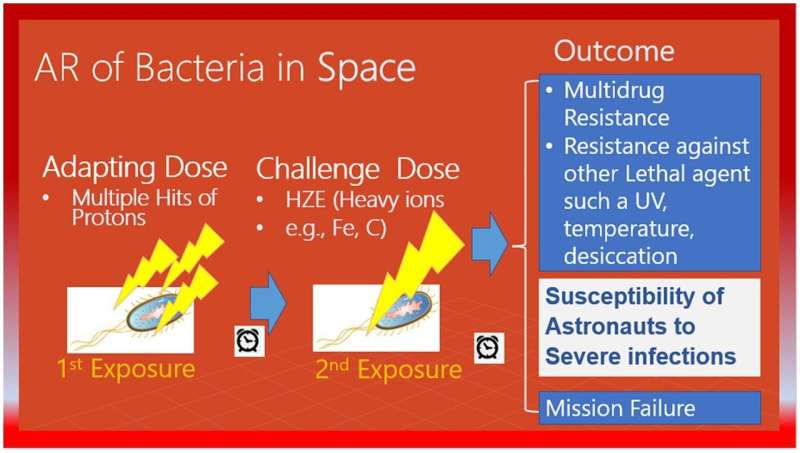This article has been reviewed according to Science X's editorial process and policies. Editors have highlighted the following attributes while ensuring the content's credibility:
fact-checked
peer-reviewed publication
trusted source
proofread
Why studying astronauts' microbiomes is crucial to ensure deep space mission success

Space exploration is a complex and risky mission that requires careful preparation and a thorough understanding of the challenges inherent to life in space.
One of the most critical aspects of this endeavor is the health of astronauts, who are exposed to extreme conditions, such as microgravity, ionizing radiation, and environmental changes. In this context, research on the human microbiome and its adaptation to the space environment has become a crucial field of study for the success of long-term space missions, in particular for trips to Mars.
The human microbiome is the set of microorganisms that live in symbiosis with our body, particularly in the intestine, skin, and mucous membranes. These microorganisms play a crucial role in digestion, immunity, and the regulation of various physiological processes.
However, the space environment can disrupt the balance of the microbiome, which can have adverse consequences for astronauts' health. Therefore, space microbiome research has become a crucial area of study to understand how microorganisms can adapt to the space environment and how this can affect the health of astronauts. My co-authors and I discuss this necessity in our new Frontiers in Microbiology article.
Preparing the microbiome for space flight
Integrating astromicrobiological preparedness into mission planning and execution is necessary to safeguard the health and well-being of astronauts and the overall success of deep space endeavors.
Astro microbiology—the study of microorganisms in outer space—involves understanding the effects of microbial persistence and succession on closed systems, such as spacecraft and habitats, and developing technologies, such as space agriculture and the extraction of microbial secondary metabolites for medicine, flavoring, and nutritional drugs. The microbiome's composition and function are likely to undergo changes during spaceflight.
Taking appropriate measures to support a healthy microbiome in astronauts may not only help maintain their health during the mission but also aid in their rehabilitation upon returning to Earth. One of the main health concerns for astronauts is radiation exposure. Space radiation is very different and much more intense than radiation on Earth, which can have harmful effects on the health of astronauts.
Microorganisms exposed to radiation can induce resistance to antibiotics, UV, heat, extreme dryness, and other potentially fatal factors. Therefore, it is essential to understand the potential effects of radiation not only on humans, but also on their microbiome to develop effective risk reduction strategies for space missions.
By exploring the microbiome of astronauts in space, we can also further understand how the space environment affects the composition and diversity of the microbiome. The unique conditions of space, such as microgravity, radiation exposure, and dietary changes, can potentially disrupt the balance of the microbiome. By studying changes in the microbiome during space travel, scientists gain knowledge about how these alterations can affect the health of astronauts and are currently in the process of developing strategies to mitigate the negative effects.

Fending off pathogens in space
In addition, the study of the microbiome can help researchers understand the impact of space travel on the immune system. The microorganisms that inhabit different parts of the human body play a crucial role in maintaining good health by producing essential vitamins and helping in the development and regulation of our immune system.
Changes in the composition of the intestinal flora caused by genetic and environmental factors can increase the likelihood of infection with pathogens, encourage the spreading of harmful organisms that, under certain environmental or genetic changes, can start to induce disease and contribute to the emergence of inflammatory disorders.
Thus, the microbiome plays a crucial role in the formation and modulation of the immune system, and any disruption of it can potentially affect immune function. Understanding how space travel affects the interaction between the microbiome and the immune system can help develop strategies to maintain the health of astronauts and prevent infections during long-duration space missions.
Opportunities and challenges
When exploring the microbiome of astronauts in space, scientists are also able to discover new microorganisms that may have unique properties and abilities that could be exploited for various applications, including the development of new drugs, antimicrobial agents, or biotechnological advances.
In addition, the altered environmental conditions in space, such as temperature, oxygen levels, and diffusion limitations, offer an opportunity to optimize the production of valuable metabolites by genetically modified microorganisms.
However, the study of the microbiome of astronauts in space also presents several challenges and obstacles. A potential danger of studying the microbiome of astronauts in space is the possible spread of pathogenic microorganisms in the enclosed environment of a spacecraft. Confined space and recycled air systems can promote the spread of pathogenic microorganisms, which can be dangerous for the health of astronauts for multiple reasons.
The confined environment of a spacecraft, coupled with prolonged exposure to microgravity, can lead to a suppression of the astronauts' immune system. This compromised immune state renders astronauts more susceptible to infections, as indicated by studies demonstrating a diminished immune response that hampers their ability to counter potentially harmful microorganisms effectively.
Furthermore, concerns arise regarding the dissemination of antibiotic resistance genes among bacteria in the astronauts' gut microbiota, facilitated by small circular DNA entities known as plasmids. This dissemination has the potential to undermine the efficacy of antibiotics.
The incomplete understanding of the intricate interactions between microbial life in space and the human immune system exacerbates the risk of infection. Consequently, the release of a pathogen within a spacecraft could significantly jeopardize the health of astronauts, particularly those with compromised immune systems, especially during extended missions.
Neglecting astromicrobiological concerns in a manned deep space mission significantly diminishes the likelihood of success. Potential pathogen release poses immediate health risks to astronauts, compromising their immune systems and task performance. Furthermore, the spread of antibiotic-resistance genes could undermine medical interventions, exacerbating health challenges during the mission. Addressing these concerns is crucial for mission success and astronaut well-being.
More information: Seyed Mohammad Javad Mortazavi et al, How the adaptation of the human microbiome to harsh space environment can determine the chances of success for a space mission to Mars and beyond, Frontiers in Microbiology (2024). DOI: 10.3389/fmicb.2023.1237564
Journal information: Frontiers in Microbiology
Provided by Frontiers





















